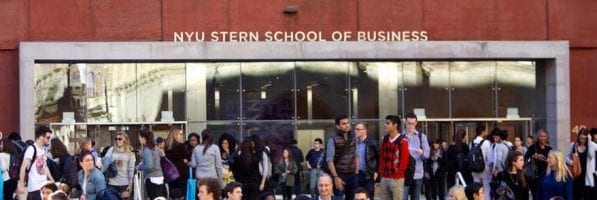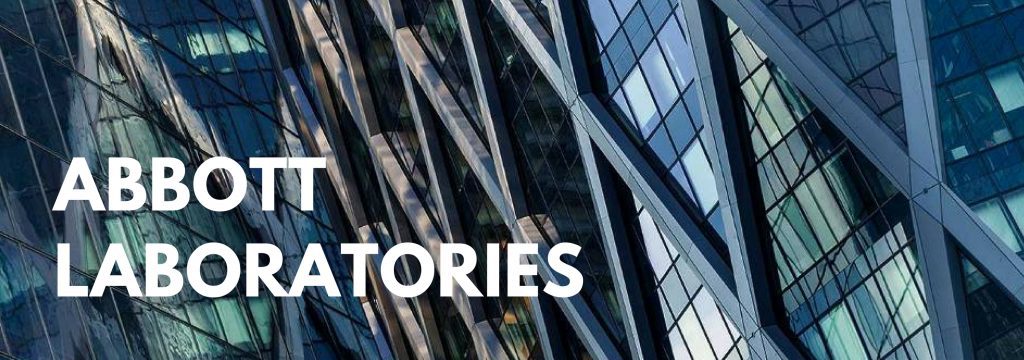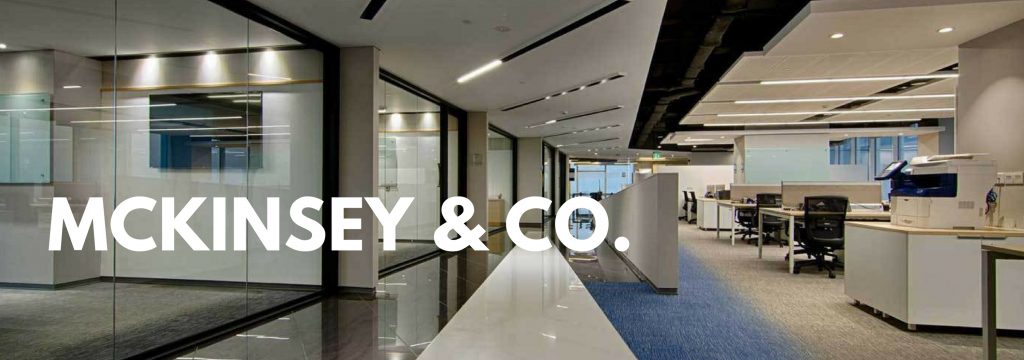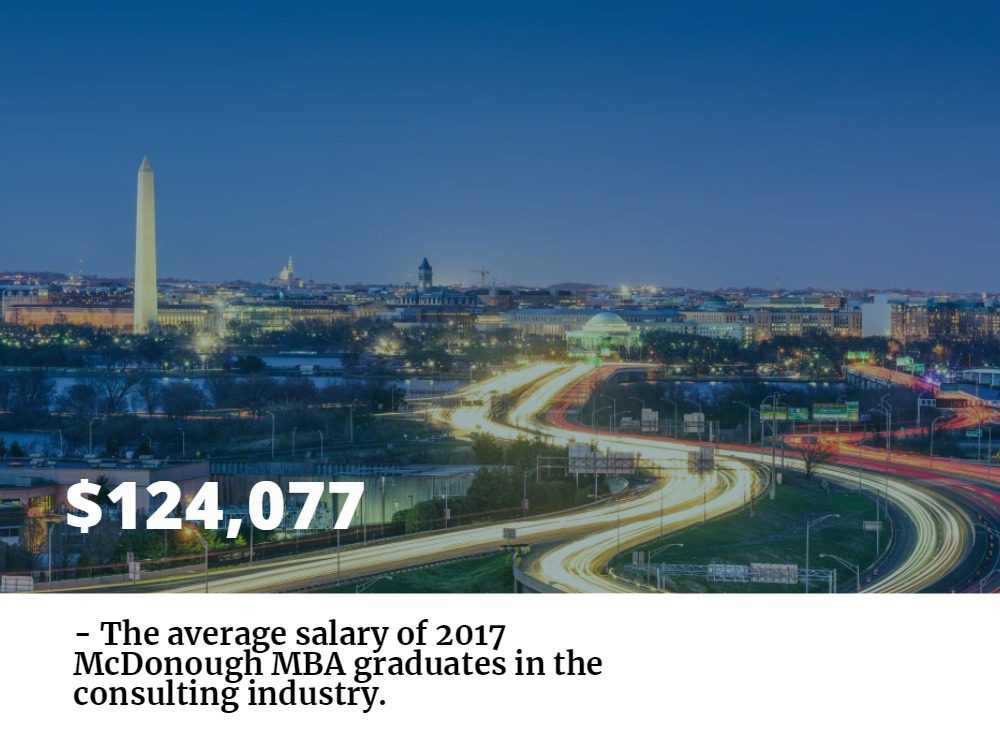Georgetown Employment Report Reveals Record-Setting Job Offers, Salaries

Georgetown University’s McDonough School of Business set records this year for both salaries and job offers according to its Class of 2018 Employment Report, released earlier this month. An impressive 98 percent of students received job offers within three months of graduation, and average full-time salary rose to an all-time high of $116,946.
MBA Graduates Get More Money and More Job Offers

Compared to last year, average starting salary increased by 4 percent. The average signing bonus for the latest graduating class was $31,036, up 9 percent year over year.
The record-setting 98 percent of students who received job offers within three months of graduation represented a 5 percent jump over the prior year. Ninety-four percent of 2018 graduates had accepted an offer within three months, up 2 percent from last year.
“Through a personalized approach to the job search, opportunities for career treks throughout the United States and around the world, and a global alumni network of 190,000 graduates, the MBA Career Center ensures students are placed in the positions that inspired them to attend business school,” Doreen Amorosa, Associate Dean of McDonough Career Services, said in a press release.
MBAs Choose Consulting, Financial Services, and Technology

For the second year in a row, consulting, financial services, and technology were the top three industries for MBA graduates. However, the breakdown within these three industries saw some shifts.
Last year, financial services was the top industry of choice, drawing an even third–33 percent–of students. Consulting was second, drawing 28 percent of grads, and technology was a distant third, at 13 percent. The most recent graduating class headed off to these three leading industries in more equal numbers. Consulting, for its part, drew 25.5 percent of students, followed by financial services at 21.7 percent, and tech at 17.5. In both years, nonprofit/social impact came in fourth, attracting 8 percent of the Class of 2018 and 7 percent of the Class of 2017.
MBA Internships Remain Steady
As for this year’s class of MBA student internships, the results remained similar to previous years with only slight increases. This year, 100 percent of students secured an internship, and 86 percent of those positions were paid an average of $7,043 per month. This was an uptick over last year, when interns averaged $6,501 per month. Also, 78 percent of all internship positions were facilitated by the MBA Career Center, a ten percent increase from 2016. Student interns gravitated toward the finance/accounting (34 percent), consulting (28 percent), and marketing & sales (17 percent) industries.
This article has been edited and republished with permissions from its original source, Clear Admit.
NYU Employment Report Reveals Employment, Salary Jump

The NYU Stern School of Business released its 2018 MBA Employment Report at the end of last month, revealing that more graduates in the Class of 2018 had accepted full-time job offers three months after graduation than anytime in the past five years. Not only that, many recent grads reported a large jump in salary and bonuses. There are just a few of the highlights from this year’s employment report, which also Amazon topping the this of MBA employers for the second year in a row.
NYU Employment Offers and Salaries Increase
This year, 93.7 percent of MBA graduates from Stern had accepted full-time job offers three months out from graduation. This was up from 91 percent last year, and higher than every year since 2013. As for compensation, average base salary jumped 6.5 percent year over year, to $129,059. Average signing bonus, meanwhile, increased 7.5 percent, to $35,637.
“We begin working hand-in-hand with our MBA students on the recruitment process before they even arrive on campus for their first semester,” says Beth Briggs, Stern Assistant Dean of Career Services. “Our early and continuous engagement, coupled with the quality of our students and a strong employment market in New York City, has led to great results across a variety of career paths. For Stern’s MBA class, the percentage of graduates who accepted job offers within three months of graduation is the highest in five years. Average salaries, average signing bonuses and the number of students reporting signing bonuses have also increased over last year.”
Consulting and Investment Banking Lead Stern Industries
When it comes to where Stern graduates work, the data remains consistent. Consulting and investment banking are the two most popular industries, luring 28.4 percent and 26.2 percent of the class, respectively. This represents a slight increase for both industries over last year. In 2017, consulting drew 26 percent and investing drew 23 percent. Technology and telecommunications stayed steady at 16.5 percent this year, on par with 2017. The only other notable changes in terms of industry appeal were a small dip in consumer packaged goods (falling to 5 percent, from 7 percent last year) and a slight increase in law (rising to 4 percent, from 2 percent).
“While the top three industries employing Stern students are consulting, investment banking, and tech, graduates are pursuing roles in a range of diverse areas including growing industries like fintech,” Briggs explains.

Amazon Hires Most Stern MBA Graduates
Amazon took the top spot for the second consecutive year as the most prolific hiring company of NYU Stern grads. Other top employers of graduates from the Class of 2018 included Credit Suisse, McKinsey & Company, J.P. Morgan, IBM, and Bain & Company. About 77.6 percent of grads accepted jobs in the Northeastern U.S., and 13.2 percent went West.
The majority of students (49.7 percent) received offers of employment from the companies where they completed their summer internships. Of those who chose not to accept a job where they interned, 20.1 percent received an offer from an on-campus scheduled interview. In addition, about 9.7 percent found their job through Stern job postings. The rest of the class found jobs through personal contacts (6.3 percent), external job boards (4.7 percent), or alumni (3.1 percent).
You can view the complete NYU Stern 2018 Employment Report here.
This article has been edited and republished with permissions from Clear Admit.
In Search of the Best Chicago Internships for MBAs

Chicago is an ideal place to earn an MBA. In addition to having some of the strongest business schools in the country, the Chicago area is home to nearly 40 of the Fortune 500 companies. The bustling metro is also the financial and cultural hub of the Midwest, making it an ideal place for major corporations to set up large outposts. This means a wealth of internship program opportunities for MBAs at the start of their careers. So, for those with the gusto to live in the gustiest metro, the rewards can be huge. Below, we’ve laid out at which companies Chicago MBAs most often seek internships with.

Given Amazon’s involvement in nearly every industry, it is no surprise that the company is on the hunt for innovative MBAs to help maintain its dominance and status as the world’s greatest internet retailer. The mammoth corporation assigns interns a project for which they will partner with clients to glean true insight into the inner-workings of the company.
According to the Wall Street Journal, “Amazon took in more interns from the University of Chicago’s Booth School of Business than either Bain & Co. or McKinsey & Co., which were until recently the school’s top hirers of interns …” Amazon also offers many interns the opportunity to come back to work at the company full-time.
Just last year, Amazon was a major player in hiring Chicago Booth School of Business MBA graduates and interns. Twenty-six graduates managed to earn a full-time job with the company, while an impressive 33 interns joined its ranks, which was the single highest total among all companies that employed Booth interns.
The companyalso brought in students from nearby Indiana. Several Class of 2018 MBA students from the Notre Dame University Mendoza College of Business earned vital internship program experience at Amazon, which often leads to direct hiring.

Many of the companies hiring MBA interns offer exposure to retail, tech, and financial services, or consulting. But Abbott Laboratories, headquartered in Lake Bluff, Illinois, is a popular internship destination for MBAs interested in pursuing a career in pharmaceuticals. The Commercial MBA Internship allows interns to get their foot in the door of this massive and growing industry.
Several MBAs at the Kellogg School of Management at Northwestern University joined Abbot Laboratories, according to the school’s most recent employment report, joined the company’s summer internship program.

Deloitte, which has a Chicago office located right near the iconic Willis Tower, employs 40,000 people in the U.S. The company’s Client Service Internship can take place throughout the course of a semester or over two months during the summer. Consulting tends to be a popular area of focus for MBA grads, but Deloitte also offers a plethora of opportunities for advanced degree students interested in financial sectors such as auditing and tax. Depending on their interests and professional backgrounds, interns can join a client service team in Deloitte & Touch LLP, Deloitte Tax LLP, Deloitte Risk and Financial Advisory, or Deloitte Consulting LLP. According to The Balance, summer interns at Deloitte can make anywhere from $3,850-$12,000 per month. Deloitte also made Fortune’s list of “25 Top MBA Employers.”

Around 50 percent of McKinsey & Company’s incoming hires have MBA degrees, so business school recruiting is a high priority for the mega firm. The consulting giant—which now has over 120 offices worldwide—was actually founded in Chicago in the 1920s, so it makes sense that the company is one of Chicago metro’s most active MBA recruiters. Though gaining entry to the elite consulting firm is extremely competitive, both University of Chicago’s Booth School of Business and Northwestern University’s Kellogg School of Business have been able to claim the company as one of the top places their MBA students land for internships and full-time employment after graduation.
In fact, no company hired more Booth grads than McKinsey and Co. The company managed to snag a staggering 48 employees from the business school last year, which accounted for nearly 10 percent of the entire Booth MBA Class of 2017. Not so surprisingly, McKinsey also brought in 26 Booth interns within the same year—the second most among any employers in that time frame.
So, what should an MBA at in the McKinsey internship program expect? According to the firm’s website, MBA interns “… join us as associates, working either as generalists or practice consultants if they have and area they’d like to focus on.”
2018 Trends: How Much Can You Get Out of a Boston MBA?

Boston, the largest city in New England, is often considered the academic, economic, and cultural center of the Northeastern United States. Beantown is also considered one of top college towns in the country thanks to its numerous esteem colleges and universities. Lots of that talent sticks too: Forbes ranks the city as one of the best places for business and careers. Continue reading…
Just How Much Are Stanford MBA Grads Getting Paid?

Wondering what kind of pay day you can expect if you are among the select 6 percent of applicants who gain admission to Stanford Graduate School of Business (GSB)? Are you sitting down? Perhaps you should be, because the school’s 2017 employment report—released today—reveals record-breaking salaries for the third year in a row.
On average, last year’s graduates, now in their first year of post-MBA work, are pulling down an annual base salary of $144,455—a $4,000 increase over last year’s all-time high (median base compensation was $140,000, also besting last year’s by about $4,000). But it doesn’t stop there. Average signing bonuses, reported by 51 percent of the class, are also up—setting a new record at $29,534. (Median salary bonuses remained unchanged at $25,000.) And as if that weren’t enough, another quarter of the class reported other guaranteed compensation (OGC) surpassing last year’s all-time highs by a whopping $10,000. Average OGC for 2017 grads was $83,065, and median OCG was $50,000. The range was $6,750 to $450,000.
The GSB, in announcing these most recent employment statistics, pointed out that OGC will no longer be tracked by the MBA Career Services and Employer Alliance (CSEA) and that it began last year capturing an “Expected Performance Bonus” metric in its place. This measure includes both guaranteed and non-guaranteed cash compensation based on performance. Though the average and median EPB for the Class of 2017, at $71,946 and $35,000, were each lower than OGC figures, a full 65 percent of the class expected to receive such performance-based compensation, up from 61 percent last year—and substantially higher than the quarter of grads who reported OGC. The reported range for EPB was $5,000 to $450,000.
Stanford MBAs claim higher pay days than graduates of any other school, in part thanks to higher base compensation. Stanford’s median base—$140,000—surpassed that of Harvard Business School (HBS) ($135,000), the University of Pennsylvania’s Wharton School ($130,000), and the University of Chicago Booth School of Business ($125,000). Grads from both Stanford and HBS reported the same median starting bonus of $25,000, but the $50,000 in other guaranteed compensation reported by Stanford grads was double what grads at the school’s top East Coast rival reported.
Tech Less of a Draw Than in Prior Years
Bucking the trend at many other business schools—where increasing percentages of students are clamoring to enter the technology industry—fewer Stanford MBA Class of 2017 grads headed into tech. In what the school deemed “a rebalancing of the scales among the three top industries,” interest in technology dropped 8 percentage points—to a mere 25 percent of the class. Almost a third of the class—32 percent—headed into finance, up a point over last year. Consulting, too, gained four percentage points to attract 20 percent of the most recent class.
“Our leading employers span a wide variety of industries,” Maeve Richard, assistant dean and director of the Career Management Center, said as part of a news story announcing the latest employment statistics on the Stanford GSB site. “They represent organizations in such areas as consulting, finance, technology, consumer products, healthcare, and nonprofits. What they do have in common is work environments that offer the ability to make an impact with a focus on agency, career development, diverse challenges, and responsibilities.”
Indeed, a record-setting 411 organizations hired Stanford MBA students and graduates for internships or full-time roles this past year—up 7 percent over last year and 34 percent from six years ago. A whopping 95 percent of employers hired just one or two students—an indication of the breadth both of GSB employers and student interest.
Uptick in Women Headed into Private Equity and Venture Capital
“In addition, we observed that the number of women going to private equity and venture capital has nearly doubled since 2014,” Richard said as part of the Stanford GSB article. “While we do not disclose fine-grain gender detail and the numbers are still small, we see a definite widening of the cracks in the glass ceiling.”
It’s no wonder that Stanford GSB women would increasingly be looking to break into PE and VC, since those fields yield some of the very highest pay days. The highest reported base salary for the Class of 2017—$285,000—went to a graduate headed into venture capital. Median base salaries for both PE and VC were $175,000, $40,000 higher than for the class as a whole. And it was a graduate headed into a private equity analyst role who reported the mind-boggling $450,000 in other guaranteed compensation. The median signing bonus for PE—at $50,000—was also the highest in the class (on par with investment banking). Though it was a graduate headed into a marketing role who claimed the highest signing bonus of the class, $77,000.
Timing and Location of Offers
Stanford GSB reports full-time offer and acceptance rates at graduation and three months out from graduation—as mandated by CSEA standards. But in past years—as this year—the school has made a point of underscoring the fact that its graduates’ confidence in their ability to find the perfect job sometimes means they hold out longer in accepting their ultimate position than graduates from some other schools. That said, 92 percent of the Class of 2017 had offers three months out from graduation—up two points over last year—and 88 percent had accepted offers, a five-point increase year over year.
In terms of where geographically the most recent Stanford MBA grads wound up, the West was the winner—with 62 percent of grads choosing to remain in the region. This represents a 3 percent decline compared to last year. “Counter to assumptions, only 35 percent of these West region jobs relate to technology,” the school notes. “Finance represented 26 percent, and consulting represented 15 percent.” The Northeastern United States drew the second-most Stanford grads, 16 percent of the class. Another 11 percent took international jobs.
Also of note, 16 percent of the class launched their own startups upon graduation, up one percentage point over last year. Leading industries for these entrepreneurial students include software (15 percent), finance (11 percent), healthcare (9 percent), real estate (9 percent), and internet services (9 percent).
More Grads Seek Socially Responsible Roles
Another notable shift in these most recent employment statistics is the increasing number of Stanford MBA grads heading into careers in socially responsible roles or organizations. Thirteen percent of this year’s graduates answered yes to the question, “Have you chosen a socially responsible role in a private business?” That’s up from just 8 percent last year, when the question was first introduced.
Watch this space for an upcoming piece that will highlight several Stanford students who chose internships focused on social impact this past summer—a Clear Admit exclusive.
This article has been edited and republished with permissions from our sister site, Clear Admit.
Georgetown McDonough MBA Career Center Releases 2017 Employment Stats

No surprise: Georgetown MBAs are making bank!
According to the most recent employment report from the Georgetown University McDonough School of Business, the average starting salary for graduates was $112,501, which is a 4 percent increase from the previous year.
“Every year, we deepen our commitment to applying a personalized approach to our students’ job searches, and every year, the results exceed our expectations,” Doreen Amorosa, associate dean and managing director of the MBA Career Center, said. “From the expanded and customized approaches to the job search in the MBA Career Center to curricular offerings like our Executive Challenge, our MBA students are prepared to excel in their careers.”
Additionally, the report stated that the average signing bonus of recent McDonough graduates were $28,516, a 13 percent increase from last year. Job offers accepted within three months of graduation also rose from 90 to 92 percent.
The report provide some addition, equally interesting information. For example, the top four industries of choice for Georgetown McDonough MBAs are financial services (33 percent), consulting (28 percent), technology (13 percent), and non-profit/social impact sector (7 percent).
MBA graduates in the consulting industry are the highest earners among recent McDonough alums, pulling in over $124,000 annually, followed closely by those employed in the healthcare industry, which earned nearly $121,000 per year. In all, McDonough MBA grads included in the report earned lucrative positions at well-known companies, like Amazon, Bank of America, Barclays, Citi Group, Credit Suisse, Deloitte, EY, Google, PwC, and Verizon.

As far as internship data goes, 99 percent of first-year students secured an internship, with 85 percent of those paid positions. The average monthly compensation for internships was $6,501. Perhaps most impressive was that 81 percent of these internships were facilitated by the MBA Career Center, which is up 13 percent from 2016.
The Georgetown McDonough MBA Career Center is home to student organizations, Career Days and Treks, and on and off-campus networking events. The center partners with McDonough School of Business alumni to connect the future business leaders of America with today’s movers and shakers.
“We have invested in numerous strategic initiatives in recent years, including customizable search technologies, alumni mentoring tools, and offerings designed to individualize each student’s career outcomes,” Amorosa added in the press release. “Those, combined with our staff of certified career coaches and career curriculum that begins the summer before students arrive on campus, we equip our students with the strategies and experiences to be successful in their search.”
